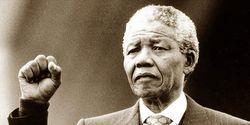I've been struggling with what seems to be the cult worship of a man I hope, sincerely, is resting in peace. Struggling because I don't believe him to be the saint that's being portrayed by the media and by the world's leaders who've gathered today at the memorial for the former prisoner and later leader of South Africa.
Struggling because, though he wasn't the saint he's being portrayed by so many to be, I recognize that he did great things, I recognize that he did redemptive things, and I recognize that I would want to be seen in a similar fashion.
What, you may ask, did he do wrong? I'm sure many are clueless. They should read and learn:
As was made clear by testimony before the Truth and Reconciliation Commission, Mandela was personally involved in the targeting and timing of terrorist bombings that took place during his
imprisonment, such as the infamous “Church Street Massacre,” designed to maximize casualties among Afrikaner women and children. Even a group as left-leaning as Amnesty International refused to grant Mandela political prisoner status because of the obviously violent character of his ideology and his actions. His African National Congress party ran a horrific camp for political prisoners in Angola, with daily torture and murder, often by the “necklacing” technique, whereby a gasoline-filled tire is placed around the neck of a victim and set ablaze. Virtually all the victims of this particular horror were blacks.
Within South Africa, on direct orders from Winnie and Nelson Mandela, the ANC targeted not only whites, but also all black civil servants, teachers, lawyers, and businessmen—essentially anyone who imagined a post-Apartheid South Africa that differed from the one mandated by the Marxist ANC. Even simple black peasants who refused to carry out terror attacks were treated as enemies, and they were killed in large numbers. Thus, just as the terroristic FLN killed far more Algerians than did the French during the Algerian war for independence, the ANC was the leading cause of death, by far, for black South Africans throughout the period of Apartheid.
Doesn't quite fit with what we're seeing on our news channels today now does it? But Mark Shea, not denying the bad, focuses on the good:
He had a lot of options when he became president, chief among them to pull South Africa into a bloodbath of race reprisals for a very real history of crimes committed against his people. He could have turned that place into Rwanda or Amin’s Uganda. He chose forgiveness. He is to be commended and honored for that. He was not a perfect man or a saint (who is?), but as politicians go, you seldom get better. As to his snuggling up to the Commies, I find myself agreeing, to my astonishment, with Newt Gingrich, in asking “What would you have done?” The commies where the ones offering to help, just as in our Revolution, the French were the ones offering to help. So he took the help he could get because our own glorious freedom-loving country was fully backing apartheid, to our shame. What is remarkable about Mandela is not what he took from the Commies, but what he refused to take: the doctrine of violent revolution. Prison had changed him somehow and he became somebody who gave up the violence of his youth and refused to inflict it on the white regime. How can that not be praiseworthy?
Here's the bottom line for me on this whole Mandela, saint or a sinner thing.
I'm no saint. Though I've not done what Mandela was puported to have done in his younger days or even from prison, I've done enough to make it clear that I'm no saint.
I am a sinner. And as a sinner, I hope and pray that one day, crowds can look at me, rightly or wrongly, and say to one another as they mourn my passing that I was a good man.
The argument is that Mandela redeemed himself. Some might disagree. I'm not sure I fully agree but in the end, what I agree or disagree with matters little. In the end, we hope for Mandela's redemption because in the end, we hope for our own.
I want and seek redemption. I think we all do. I believe Mr. Mandela did.
I hope he found it.
I hope I will.
Carry on.
 imprisonment, such as the infamous “Church Street Massacre,” designed to maximize casualties among Afrikaner women and children. Even a group as left-leaning as Amnesty International refused to grant Mandela political prisoner status because of the obviously violent character of his ideology and his actions. His African National Congress party ran a horrific camp for political prisoners in Angola, with daily torture and murder, often by the “necklacing” technique, whereby a gasoline-filled tire is placed around the neck of a victim and set ablaze. Virtually all the victims of this particular horror were blacks.
imprisonment, such as the infamous “Church Street Massacre,” designed to maximize casualties among Afrikaner women and children. Even a group as left-leaning as Amnesty International refused to grant Mandela political prisoner status because of the obviously violent character of his ideology and his actions. His African National Congress party ran a horrific camp for political prisoners in Angola, with daily torture and murder, often by the “necklacing” technique, whereby a gasoline-filled tire is placed around the neck of a victim and set ablaze. Virtually all the victims of this particular horror were blacks.